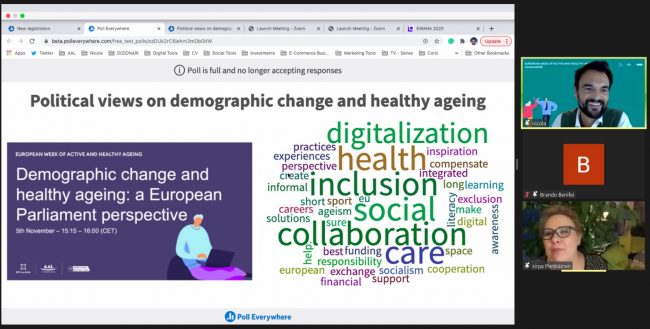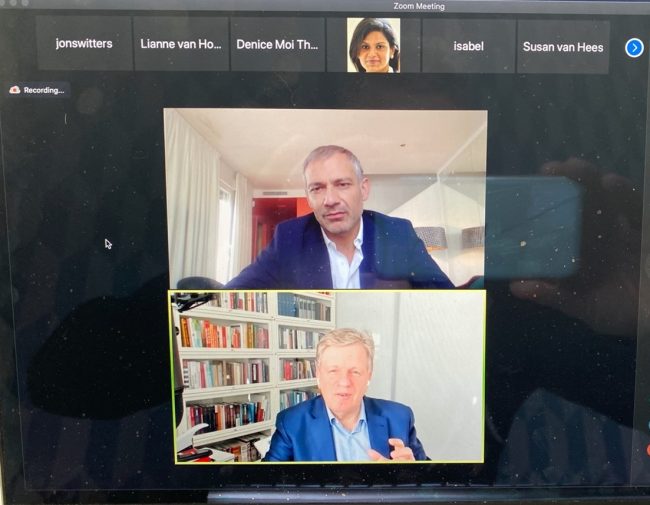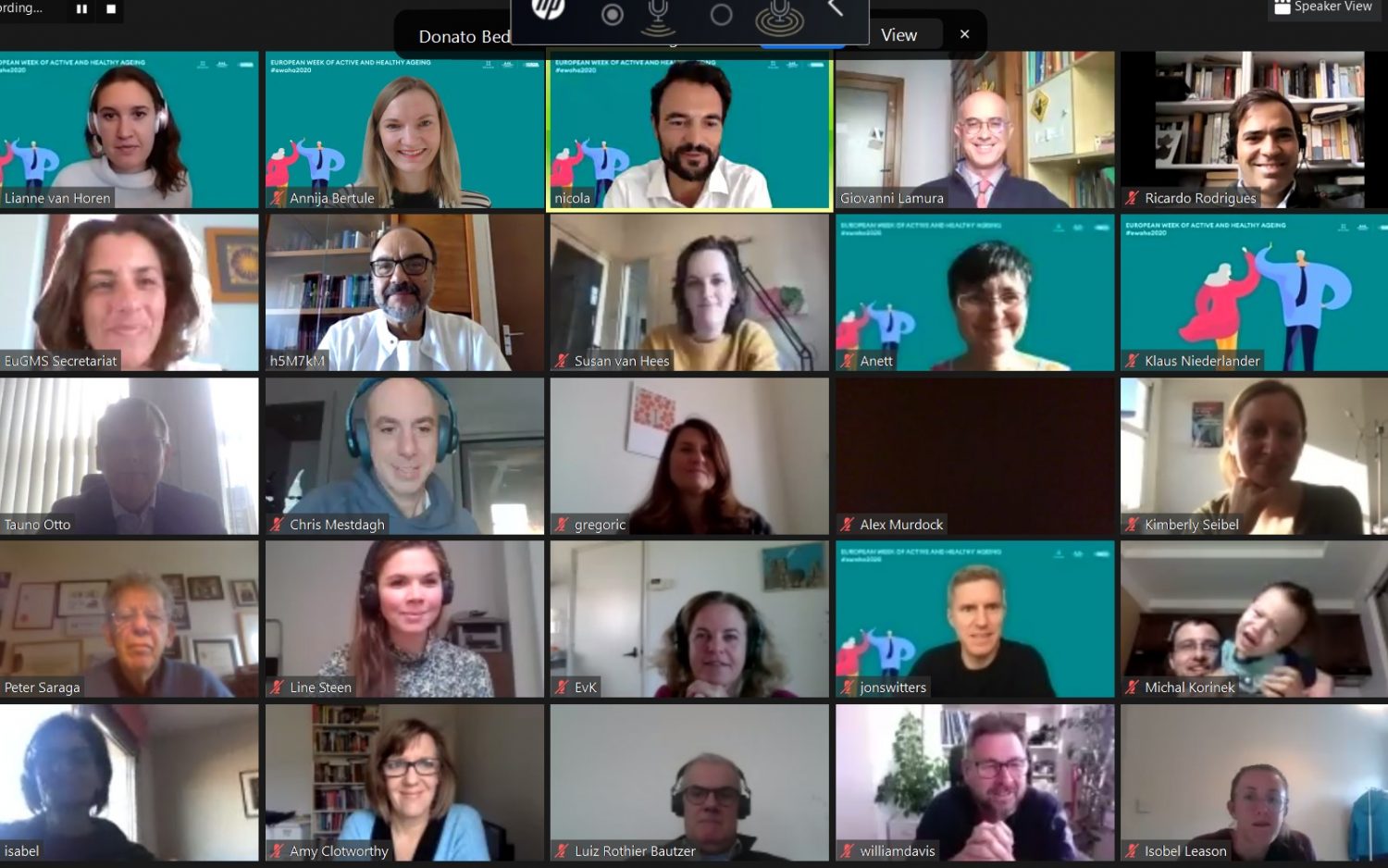The European Week of Active and Healthy Ageing
Bringing the focus on ageing well in Europe in the 2020s
The 1st edition of the European Week of Active and Healthy Ageing (EWAHA), took place last week, between 2 and 6 November, 2020 in an online format. The AAL Programme would like to send a big THANK YOU to all of the attendees, who made this week a great success for community building and exchange of many interesting views to create a vision for Europe that provides a life happy at all ages for everybody.
The Week was attended by 800 people from across Europe, Canada, Taiwan, Australia and other countries, and it staged a stimulating debates and exchanges with politicians, local and national administrators, practitioners, geriatrics and psycologists providing a fruitful and exciting environment for an exchange between different perspectives across a wide array of topics related to ageing.
The event brought the demographic change issues and opportunities under the spotlight and it was organized by the AAL Programme, jointly with the EIPA AHA and the MYBL. The week took inspiration from the WHO Decade of Healthy Ageing to shed light on four main priorities: the sustainability of health and care in an ageing Europe; the intergenerational policies; the promotion of a socio-economic case for an ageing society; and the role of technology for the improvement of the conditions of the older people and their carers.
The three organizing initiatives have all had collaborated closely already in 2019-2020 to unite their efforts for a European ageing society. Now, they have put demographic change more prominently onto Europe’s research and innovation political agenda in the form of this European Week.
Read the Executive summary below
The AAL Programme organised four different events during this week. Read the highlights of them, as well as the Closing session below!
Reflections for an ageing Europe and the world: the opening ceremony
The Week began with two high level keynote speakers:the Vice President of the European Commission, Dubravka Šuica, and the Independent Expert for the United Nations on the Enjoyment of all Human Rights by Older Persons, Claudia Mahler. Moderated by Klaus Niederländer, these prominent policy-makers reflected on the main learnings from the current Covid-19 crisis, the thoughts on how future strategies and activities both from the UN and EU can pave the way for positive change, as well as discussing the ways the stakeholders can improve and address the demographic change in the upcoming decade. Many cross-cutting areas were put at the forefront as key to create positive change, namely intergenerational fairness and collaboration, life-long learning policies, and the continuous and growing attention to ensuring human rights -such as the access to health- for everybody, including older adults.
As pointed out by the European Commission’s Vice-President Dubravka Šuica highlighted in her speech, namely that we ‘ me must work together as much as possible’, and that we have to remember that ‘ rights have no age limit!’.
See the full opening discussion here
The Senior Entrepreneurship Smart Ageing Prize Award: the AAL way to support happy and independent ageing
A special session took place on 3 November, when the Smart Ageing Prize Award Final reached the finish line of a contest that lasted many months full of hard work by our contestants. This edition of the bi-annual prize was dedicated the very timely topic of Senior Entrepreneurship and gathered innovators from various European countries to foster their ideas and support their journey with a prize pot worth 50 000 euros. As highlighted by Constance Agyeman, Head of International Development and Communities at Nesta Challenges, “Senior enterprise is a powerful way to empower older adults to contribute to society and form meaningful connections. This in turn helps to create resilient and sustainable businesses and social ventures, as well as leveraging the complementary skills and knowledge of younger adults for intergenerational collaboration.”
Congratulations to Diaspo winning the main prize of 35 000 euros, as well as the runner-ups Grandnanny and Parlangi! Read more about the finalists here.
See the Award Ceremony here
The effects of the pandemic on the older citizens in Austria, France and Italy: economic, health and social aspects
The third session on 3 November focused on the main effects that the pandemic has been having on the lives of older adults and the care givers in three different European countries. This 45-minute moderated session saw a high level of interaction from the audience, who also shared their experiences from various countries.
The main takeaways from the sessions were provided by the three experts, and they centered around several important challenges that have not always been equally recognized. Firstly, as highlighted by Doctor Athanasios Benetos, President of the European Geriatrics Society in France, the crisis has shown that the safety of older adults has to be based on concentrated efforts of ensuring the safety of medical personnel as well, he also added that ‘we understand more than ever that we must work together to tackle such challenges and coordinate responses.’ Moreover, the importance of understanding the hidden consequences such as the toll the crisis has taken on informal carers, that are often women and/or migrants suffer by extension leading to such further issues as deterioration of mental health and lack of financial safety net, which have to be addressed on an equal level by the decision-makers
Watch the full session here
Political visions for an ageing Europe: a dialogue with Members of the EU Parliament, Sirpa Pietikainen and Brando Benifei

This political panel aimed at bringing the voices of two politicians representing main political European families to debate about theirlong-term visions for an ageing Europe and the possible responses to this profound societal shift that is taking place. Both Sirpa Pietikainen and Brando Benifei brought in the different experiences of their Finnish and Italian constituencies, but they also shared a common positive view on the opportunities that longevity offers. The key points presented from both politicians was the need to move to community care systems and ensure that works in the supporting role of health and care networks, which according to Mr Benifei will also serve as a greater barrier against future pandemics.
A particular focus , according to Ms Pietikainen needs to be on the way our societies sees the elderly adults,’ the key is to develop an truly intergenerational approach to life where the work of the active ages are reworded in the moment of rest, at the end of the life course. Also -she continued- ’we must look into ways to build truly collaborative societies where everybody commit to care for someone’, allowing in that way an informal network of caregiving.’
Watch the full session here
Interview with Esko Aho: The Future of Health and Care in Europe

To close the European Week of Active and Healthy Ageing, Jose Usero interviewed Mr. Esko Aho, former Finnish Prime Minister from 1991-1995. Jose and Mr. Aho highlighted the major systematic changes needed in active and healthy ageing and the silver economy including the move from standardised to personalised products and services, a greater focus on ecosystems and the need to actively involve the private sector and people.
“Crisis’ can be healthy, crisis’ can provide opportunities” stressed Mr. Aho when discussing the COVID-19 situation. He stated that there is a need to urgently improve productivity in the healthcare sector through investments in digital infrastructure, coupled with a need for training to develop multidisciplinary talents that combine healthcare professionalism with knowledge of digital technology. These are the investment areas that should have high priority when Europe begins to recuperate after the current pandemic.
When looking at ensuring the ageing population has access to accessible, usable and affordable products and services in the future, Mr Aho said “We have to be able to create a diversified selection of products, solutions and services for the 65+ market”. A one size fits all approach will not be sufficient. Also, the demand and supply sides have to come together to build the market for silver economy products. There is a huge potential not only in Europe but everywhere in the world and the European Union should promote market creation for the silver economy products.
“Silver is the next green” stated Mr. Aho when talking about the common aspects between the green and the silver economy. Both challenges need to be addressed immediately and both could present a huge risk for Europe if we fail to change existing systems. However, just as Europe is doing with the green economy, Europe can turn the risk of demographic change into an opportunity.

